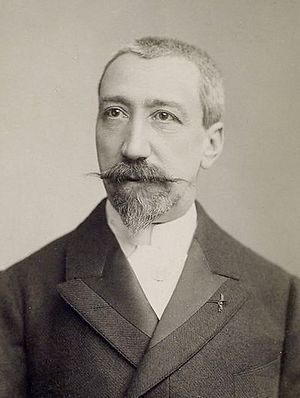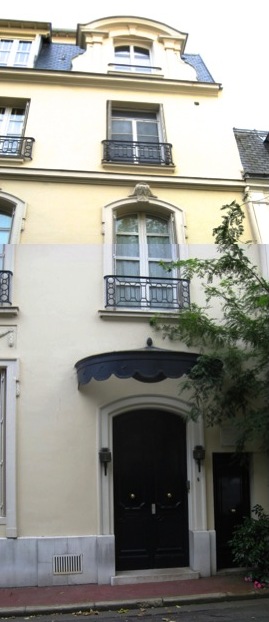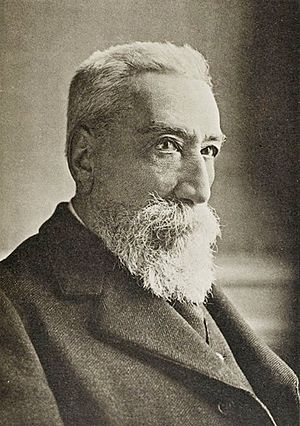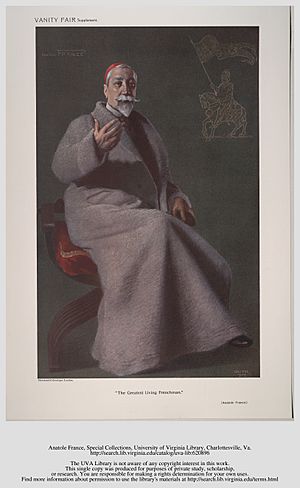Anatole France facts for kids
Quick facts for kids
Anatole France
|
|
|---|---|
 |
|
| Born | François-Anatole Thibault 16 April 1844 Paris, France |
| Died | 12 October 1924 (aged 80) Tours, France |
| Occupation | Novelist |
| Notable awards | Nobel Prize in Literature 1921 |
| Spouse | Valerie Guérin de Sauville Emma Laprevotte |
| Signature | |
Anatole France (born François-Anatole Thibault, 16 April 1844 – 12 October 1924) was a famous French writer. He was a poet, journalist, and novelist. Many of his books became best-sellers.
People at the time thought he was a very smart and witty French writer. He was a member of the Académie Française, a famous French group that protects the French language. In 1921, he won the Nobel Prize in Literature. He received the award for his "brilliant literary achievements." These achievements were known for their beautiful style, deep understanding of people, and true French spirit.
Many believe that Anatole France was the inspiration for a character named Bergotte. This character appears in the famous book series In Search of Lost Time by Marcel Proust.
Contents
Early Life and Books
Anatole France was the son of a bookseller. He loved books and spent most of his life around them. His father's shop focused on books about the French Revolution. Many writers and scholars visited the store.
France went to a private Catholic school called Collège Stanislas de Paris. After finishing school, he helped his father in the bookstore. Later, he worked as a cataloguer for other book companies. In 1876, he became a librarian for the French Senate.
Becoming a Writer
France started his writing journey as a poet and journalist. In 1869, one of his poems was published. He also wrote many articles starting in 1867.
He became well-known for his novel Le Crime de Sylvestre Bonnard (1881). The main character, an old scholar named Sylvester Bonnard, was a lot like France himself. People praised the book for its elegant writing. It also won him an award from the Académie Française.
In his book La Rotisserie de la Reine Pedauque (1893), France made fun of people who believed in magic. In Les Opinions de Jérôme Coignard (1893), he captured the feeling of the late 1800s. He was chosen to join the Académie Française in 1896.
France also played a part in the Dreyfus Affair. This was a big event in France where a Jewish army officer, Alfred Dreyfus, was wrongly accused of spying. France signed a public letter supporting Dreyfus. He also wrote about the affair in his 1901 novel Monsieur Bergeret.
Later Works and Awards
France's later books often had deep meanings and humor.
- Penguin Island (1908) is a funny story. It shows penguins turning into humans after a mistake. The book makes fun of human nature and French history. It even talks about the Dreyfus affair.
- The Gods Are Athirst (1912) is a novel set during the French Revolution. It tells the story of a man who strongly believes in the revolution's ideas. The book warns against being too extreme in political beliefs.
- The Revolt of the Angels (1914) is seen as one of France's most thoughtful and ironic novels. It's about an angel who becomes an atheist and joins other fallen angels. The story explores ideas about change and power.
Anatole France received the Nobel Prize in 1921. He passed away in 1924. He is buried in the Neuilly-sur-Seine Old Communal Cemetery near Paris.
In 1922, the Catholic Church placed all of France's works on its "List of Prohibited Books." This list was stopped in 1966. France actually saw this as a special honor.
Personal Life and Beliefs
In 1877, France married Valérie Guérin de Sauville. Her grandfather was a painter. Their daughter, Suzanne, was born in 1881.
France had a complicated personal life. In 1888, he started a relationship with Madame Arman de Caillavet. She ran a famous literary gathering place. Their relationship lasted until shortly before her death in 1910.
In 1920, France married for the second time to Emma Laprévotte.
France was a socialist. This means he believed in a society where wealth is shared more equally. He strongly supported the 1917 Russian Revolution. In 1920, he also supported the new French Communist Party.
In his book The Red Lily, France wrote a famous quote: "The law, in its majestic equality, forbids rich and poor alike to sleep under bridges, to beg in the streets, and to steal loaves of bread." This quote highlights how laws can sometimes affect rich and poor people differently.
His Reputation
The English writer George Orwell defended Anatole France's work. He said that France's books were still very enjoyable to read. Orwell believed that some people criticized France for political reasons.
Selected Works
Poetry
- Poèmes dorés (1873)
- Les Noces corinthiennes (The Bride of Corinth) (1876)
Novels and Stories
- Le Crime de Sylvestre Bonnard (The Crime of Sylvestre Bonnard) (1881)
- Thaïs (1890)
- La Rôtisserie de la reine Pédauque (At the Sign of the Reine Pédauque) (1892)
- Le Lys rouge (The Red Lily) (1894)
- L'Île des Pingouins (Penguin Island) (1908)
- Les dieux ont soif (The Gods Are Athirst) (1912)
- La Révolte des anges (The Revolt of the Angels) (1914)
Memoirs
- Le Livre de mon ami (My Friend's Book) (1885)
- Le Petit Pierre (Little Pierre) (1918)
Plays
- Crainquebille (1903)
- La Comédie de celui qui épousa une femme muette (The Man Who Married A Dumb Wife) (1908)
Historical Biography
- Vie de Jeanne d'Arc (The Life of Joan of Arc) (1908)
See also
 In Spanish: Anatole France para niños
In Spanish: Anatole France para niños
 | Jessica Watkins |
 | Robert Henry Lawrence Jr. |
 | Mae Jemison |
 | Sian Proctor |
 | Guion Bluford |




